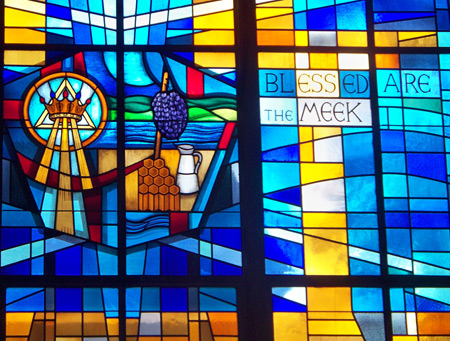Sunday 17 August 2014
The Beatitudes
The great saints who write tell us that the Beatitudes are the work of God's grace in us in the life of the virtues. The Beatitudes do not take the place of the Ten Commandments, but compliment the Law by showing the way of love. One could call the Beatitudes the Law of Love.
Garrigou-Lagrange has the best short explanation of the Beatitudes I have found.
The first three beatitudes tell the happiness that is found in the flight from sin and deliverance from it, in poverty accepted for love of God, in meekness, and in the tears of contrition. The two following beatitudes are those of a Christian's active life: they correspond to the thirst for justice and to mercy exercised toward one's neighbor. Then come those of the contemplation of the mysteries of God: the purity of heart which prepares the soul to see God, and the peace which springs from true wisdom. Finally, the last and most perfect of the beatitudes unites all the preceding ones in the very midst of persecution endured for justice' sake. These are the final trials, the condition of sanctity.
We shall follow this ascending order to get a precise idea of Christian perfection, taking care not to lessen it. We shall see that Christian perfection goes beyond the limits of asceticism, or of the exercise of the virtues according to our own activity, and that it implies the eminent exercise of the gifts of the Holy Ghost. The superhuman mode of the gifts, when it becomes frequent and manifest, characterizes the mystical life, or the life of docility to the Holy Ghost.
Following St. Augustine, St. Thomas teaches that the beatitudes are acts proceeding from the Holy Ghost or from the virtues perfected by the gifts.
The whole focus in the Beatitudes is not really on "us" but on God in us. Those who have come to this "docility", this life of the realization and living of the Indwelling of the Trinity are those who live the life of the Beatitudes.
(Notice, I am avoiding the horrid Jerusalem Bible translation of the "Happytudes".)
Garrigou-Lagrange divides the Beatitudes into the stages of attaining perfection: the Beatitudes of "deliverance from sin", of "the active life of the Christian", and the Beatitudes of "contemplation and union with God."
Because of space and time, I shall only highlight the last one with Garrigou-Lagrange's words:
Lastly, in the eighth beatitude, the most perfect of all, Christ
shows that all He has said is greatly confirmed by affliction borne with love: "Blessed are they that suffer persecution for justice' sake: for theirs is the kingdom of heaven." The final trials especially, the requisites for sanctity, are indicated here.
Christ's surprising statement had never been heard before. Not only does it promise future happiness, but it declares that a soul should consider itself happy even in the midst of afflictions and persecutions suffered for justice. This is an altogether supernatural beatitude, which is practically understood only by souls enlightened by God. There are, moreover, many spiritual degrees in this state, from that of the good Christian who begins to suffer for having acted well, obeyed, and given good example, up to the martyr who dies for the faith. This beatitude applies to those who, converted to a better life, encounter only opposition in their surroundings. It applies also to the apostle whose action is hindered by the very people he wishes to save, when they will not pardon him for having spoken the Gospel truth too clearly. Entire countries sometimes endure this persecution, such as the Vendee during the French Revolution, Armenia, Poland, Mexico, and Spain.
This beatitude is the most perfect because it is that of those who are most clearly marked in the image of Jesus crucified. To remain humble, meek, and merciful in the midst of persecution, even toward persecutors, and in this torment not only to preserve peace but to communicate it to others, is truly the full perfection of Christian life. It is realized especially in the last trials undergone by perfect souls which God purifies by making them work for the salvation of their neighbor. All the saints have not been martyrs, but they have, in varying degrees, suffered persecution for justice' sake, and they have known something of that martyrdom of the heart which made Mary the Mother of Sorrows.
I highly suggest reflecting on this entire section found here:
http://www.christianperfection.info/tta20.php
Subscribe to:
Post Comments (Atom)


No comments:
Post a Comment